Related Research Articles
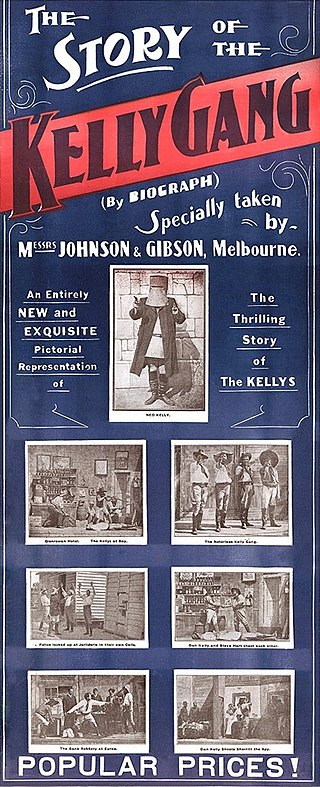
The Story of the Kelly Gang is a 1906 Australian Bushranger film directed by Charles Tait. It traces the exploits of 19th-century bushranger and outlaw Ned Kelly and his gang, with the film being shot in and around Melbourne. The original cut of this silent film ran for more than an hour with a reel length of about 1,200 metres (4,000 ft), making it the longest narrative film yet seen in the world. It premiered at Melbourne's Athenaeum Hall on 26 December 1906 and was first shown in the United Kingdom in January 1908. A commercial and critical success, it is regarded as the origin point of the bushranging drama, a genre that dominated the early years of Australian film production. Since its release, many other films have been made about the Kelly legend.

Ronald Grant Taylor was an English-Australian actor best known as the abrasive General Henderson in the Gerry Anderson science fiction series UFO and for his lead role in Forty Thousand Horsemen (1940).

Daniel Kelly was an Australian bushranger and outlaw. The son of an Irish convict, he was the younger brother of the bushranger Ned Kelly. Dan and Ned killed three policemen at Stringybark Creek in northeast Victoria, near the present-day town of Tolmie, Victoria. With two friends, Joe Byrne and Steve Hart, the brothers formed the Kelly Gang. They robbed banks, took over whole towns, and kept the people in Victoria and New South Wales frightened. For two years the Victorian police searched for them, locked up their friends and families, but could not find them. Dan Kelly died during the infamous siege of Glenrowan.

A coffee palace was an often large and elaborate residential hotel that did not serve alcohol, most of which were built in Australia in the late 19th century.

Andrew George Scott, also known as Captain Moonlite, though also referred to as Alexander Charles Scott and Captain Moonlight, was an Irish-born New Zealand immigrant to the Colony of Victoria, a bushranger there and in the Colony of New South Wales, and an eventual and current day Australian folk figure.

The handwritten document known as the Jerilderie Letter was dictated by Australian bushranger Ned Kelly to fellow Kelly Gang member Joe Byrne in 1879. It is one of only two original Kelly letters known to have survived.

Forty Thousand Horsemen is a 1940 Australian war film directed by Charles Chauvel. The film tells the story of the Australian Light Horse which operated in the desert at the Sinai and Palestine campaign during World War I. It follows the adventures of three rowdy heroes in fighting and romance. The film culminates at the Battle of Beersheba which is reputedly "the last successful cavalry charge in history". The film was clearly a propaganda weapon, to aid in recruitment and lift the pride of Australians at home during World War II. It was one of the most successful Australian movies of its day. It was later remade in 1987 as The Lighthorsemen.
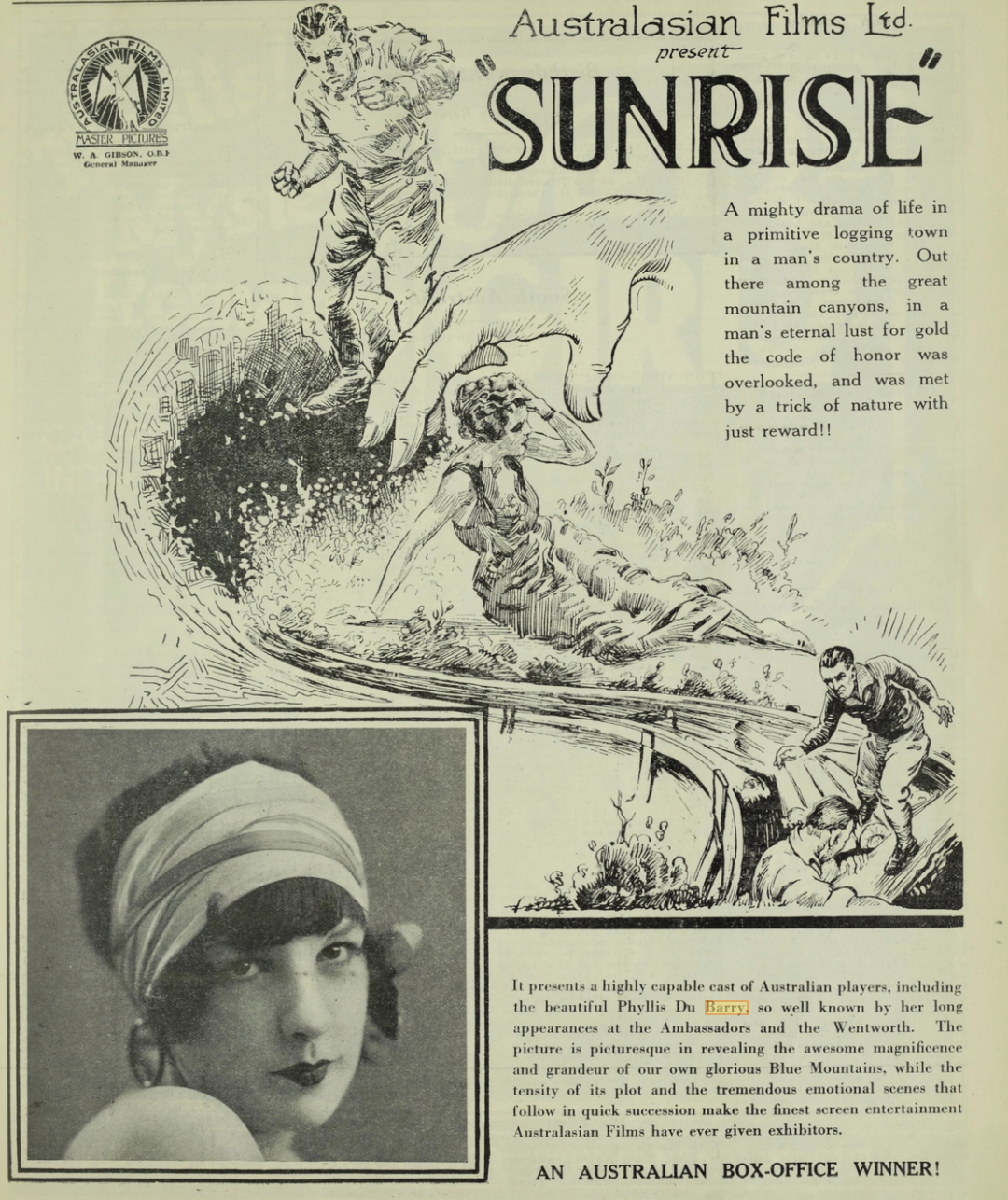
Sunrise is a 1926 Australian silent film co-directed by Raymond Longford, who took over during filming.
When the Kellys Rode is a 1934 Australian film directed by Harry Southwell about Ned Kelly.
When the Kellys Were Out is a 1923 Australian feature-length film directed by Harry Southwell about Ned Kelly. Only part of the film survives today.
The Kelly Gang; or the Career of the Outlaw, Ned Kelly, the Iron-clad Bushranger of Australia is an 1899 Australian play about bushranger Ned Kelly. It is attributed to Arnold Denham but it is likely a number of other writers worked on it.
J. J. Kenneally was an Australian journalist and trade unionist. An early populariser of Australian bushranger Ned Kelly and his gang via his book The Inner History of the Kelly Gang and Their Pursuers (1929), he was also one of the original members of the country's Labor Party and later formed his own party.
Joseph Dalgarno Melvin was a Scottish-born journalist and editor, mainly based in Melbourne, Victoria.
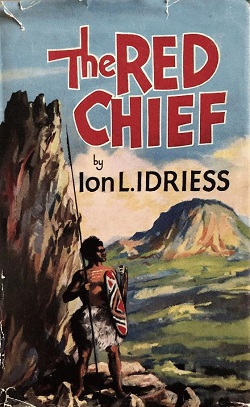
The Red Chief: As Told By the Last of His Tribe is a 1953 book by Ion Idriess about Gambu Ganuurru or Red Kangaroo, a tribal leader in the Gunnedah region in the 18th century prior to European settlement.
Edgar Ray was an English entrepreneur who launched two magazines in Australia, Melbourne Punch and Sydney Punch. On his return to England, he is credited with founding another, named Touchstone or The New Era.
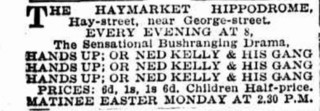
Hands Up, or Ned Kelly and His Gang is a 1900 Australian play by Edward Irham Cole about Ned Kelly.
The Inner History of the Kelly Gang is a 1929 Australian biography of Ned Kelly and his gang by J. J. Kenneally. For a time it was considered the most authorotative version of Kelly's life.
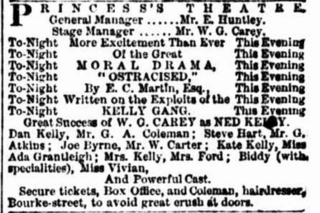
Ostracised, or Every Man's Hand Against Them is a 1881 Australian play about Ned Kelly by E.C. Martin. It was the first straight dramatisation of the Kelly story from an Australian writer although there had been one in London. The play was banned in Sydney.
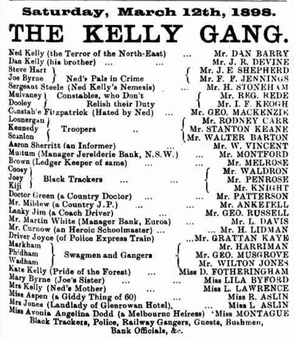
The Kelly Gang is a 1896 Australian play about Ned Kelly by actor Reg Rede. The play, heavily influenced by the stage adaptation of Robbery Under Arms - in which Rede had appeared - was very popular and much imitated by the authors of other plays about Ned Kelly.
Foiled, or Australia Twenty Years Ago is a 1871 Australian stage play by Walter Cooper.
References
- ↑ "Advertising". The Argus (Melbourne) . No. 10, 232. Victoria, Australia. 3 April 1879. p. 8. Retrieved 6 April 2024– via National Library of Australia.
- 1 2 "THEATRE ROYAL". The Argus (Melbourne) . No. 10, 231. Victoria, Australia. 2 April 1879. p. 5. Retrieved 6 April 2024– via National Library of Australia.
- ↑ "THE QUEEN'S THEATRE". The Sydney Morning Herald . No. 12, 832. New South Wales, Australia. 19 May 1879. p. 5. Retrieved 6 April 2024– via National Library of Australia.
- ↑ "Victorian News". The Evening News . No. 3737. New South Wales, Australia. 2 April 1879. p. 2. Retrieved 6 April 2024– via National Library of Australia.
- ↑ "MUSIC & DRAMA". The Sydney Mail and New South Wales Advertiser . Vol. XXVII, no. 980. New South Wales, Australia. 12 April 1879. p. 586. Retrieved 6 April 2024– via National Library of Australia.
- ↑ "SUNDRY SHOWS", The Bulletin, Sydney, N.S.W: John Haynes and J.F. Archibald, 25 June 1881, nla.obj-235873532, retrieved 6 April 2024– via Trove
